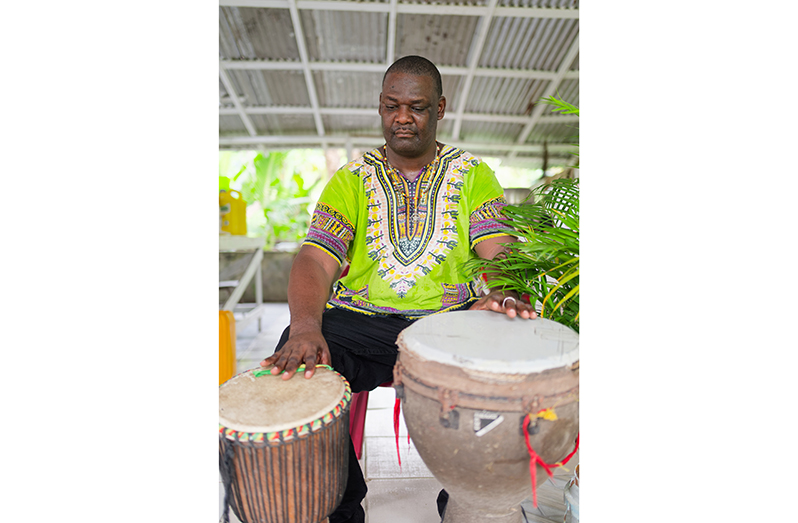Emancipation is many things: a true display of tradition, culture, creativity, and another aspect the Pepperpot Magazine explored this week, spirituality. Pelham Granville is among hundreds of Afro-Guyanese who consider Emancipation more than a holiday. For Pelham Granville, Emancipation means connection to his roots in a unique way. Coming from the community of Stanleytown on [

Emancipation and African Spirituality
Emancipation is many things: a true display of tradition, culture, creativity, and another aspect the Pepperpot Magazine explored this week, spirituality. Pelham Granville is among hundreds of Afro-Guyanese who consider Emancipation more than a holiday. For Pelham Granville, Emancipation means connection to his roots in a unique way.
Coming from the community of Stanleytown on the West Bank of Demerara, Pelham has dedicated himself to learning about the intricacies of many different cultures, but African spirituality was of unique interest to him. Today, he is a religious leader in his community, and every year, Emancipation presents a one-of-a-kind opportunity for Pelham to share, experience, and educate others on the history of his ancestors. This year is no different; Pelham and the rest of his community hope to bring tradition alive with their emancipation celebration.
Keeping true to his roots, Pelham’s observation of Emancipation is as close to historically correct as possible, with a grand display coupled with various religious activities. Describing them, Pelham stated, “On the 3rd of August, we’ll be having our spiritual work. Some people call it spiritual work or invocation where we invoke our ancestors. We’ll start with a libation ceremony at 6 o’clock, using palm, grain, and dark water. The next day, we ask Mother Oya, the orisha in charge of the cemetery, to release our ancestors so they can be entertained. After the libation ceremony, we entertain them with gandha light up, dance, and prayer, asking for their guidance and healing. Our ancestors are our guiding angels.”
Everyone has an appreciation for their past. But Pelham takes a step further, seeking to break stereotypes and educate others on the lesser-known topic of African gods. As he states, “The ancestral work and the orisha work are different. We entertain Papashango with a bonfire near the water, invoking Mother Ocean, the goddess of wealth, for our needs. We acknowledge Olódùmarè, the supreme goddess, and sing spiritual songs, as the Bible instructs, because ‘a body without the spirit can’t function.’ Our culture and spirituality are deeply intertwined, and we must continue our spiritual practices to honour our ancestors and maintain balance.”
Contrary to popular belief, Pelham firmly believes that African spirituality and comparative religion can not only coexist but complement each other. As he stated, “Before planting or building, we pour libation to thank Mother Earth. The pandemic is a reminder to return to our spiritual roots and celebrate in a spiritual way. Comparative religion study shows that without deep spirituality, our culture is incomplete. We must use our spiritual gifts for good, love our neighbours, and remember our powerful heritage. Black is double power, not just for mourning. We must embrace our spiritual culture, honour our ancestors, and seek deeper understanding.”
Pelham believes that African spirituality has been lost throughout the years. He explained that, like all belief systems, African religions began as a way for its people to gain freedom. However, this intention has been lost over the centuries and is now misunderstood by many. As he explains, “Our ancestors used to do spiritual work to be free. The Bible says, ‘Faith without works is dead,’ and our ancestors did the spiritual work to gain freedom. Today, many lack knowledge and find themselves in trouble because they don’t continue ancestral practices. Herbs like cannabis were used for medicine and invocation, not just for smoking. In African culture, herbs have spiritual significance.”
However, there are some parts of culture that still remain, drumming being among the most important. As Pelham explained, “Drumming is an essential part of our culture, used to send messages. Drummers must prepare the drum spiritually so it can send the right message. Our ancestors used drums to communicate between villages, and the drums played a crucial role in our culture. Preparing the drum involves spiritual rituals to ensure it can convey the correct messages.”
Emancipation has become synonymous with various things, with dances, music, and food being among the most popular. But Pelham believes that the holiday should be more than that, as he shared, “Our culture is not just about performances; it’s deeply spiritual. Our ancestors used to celebrate with drumming, cooking, and gathering together. The pandemic has reminded us to return to these roots and honour our culture in a spiritual way. Comparative religion shows that spirituality is essential for cultural completeness. Christianity often misses the depth of our culture, leading to a lack of knowledge and spiritual imbalance.”
One of the most important and often overlooked practices, in Pelham’s opinion, is libation, the foundation of African spirituality. As he explains, “In African culture, libation is an important ritual. Before any significant activity, like farming or building, we pour libation to thank Mother Earth. This practice acknowledges the presence and support of our ancestors. The pandemic has highlighted the importance of returning to our spiritual roots and honouring our culture in a meaningful way.”
But above all else, Pelham says that Emancipation is about togetherness; it is an opportunity for every Guyanese, regardless of race, to learn about one of the nation’s many peoples.
author Shaniya Harding